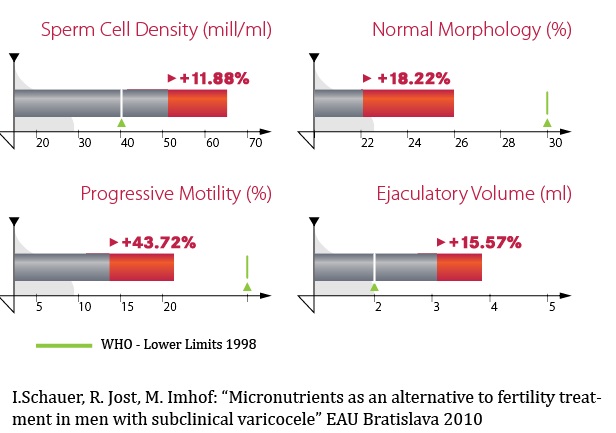“Micronutrients as an alternative to fertility treatment in men with subclinical varicocele”
Varicocele Study 2009
What is the role of varicocele in male infertility?
Approximately 15-20% of all adult males have a varicocele. In men with primary fertility this rate increases to 40%, in men with secondary infertility, i.e. previous and current infertility, it even goes up to 70% (ASRM: Practice Committee 2006). The precise mechanism for the harmful effect of varicocele on testes, sperm quality or ultimately reproductive capacity has not been conclusively established and appropriate treatment and indication are still subject of on-going discussion.
Varicocele and oxidative stress
One of the most important pathophysiological and therapeutic approaches indicates high levels of oxidative stress in the testes of men with varicocele. It has been established that varicocele patients have an imbalance between reactive oxygen species and antioxidant capacity, as well as the suspected inadequate biosynthesis of the antioxidant coenzyme Q10; both are the primary causes of oxidative damage. These manifest themselves particularly in the cell membranes with a high portion of unsaturated fatty acids, such as the membranes of sperm.
How are varicocele treated?
As well as surgical or interventional therapy, treatment with micronutrients represents a further, more recent form of subfertility or infertility treatment of varicocele patients. While micronutrients and antioxidants are often used with good results in men with idiopathic infertility, they are still relatively unexplored as treatment option for men with varicocele. With varicocele, the typical approach would be to improve the environment by reducing inflammation and oxidative stress with anti-inflammatory drugs (NSAIDs) as well as antioxidant substances such as vitamin E, glutathione and coenzyme Q10. The use of L-carnitine and L-acetylcarnitine, both of which are essential for the transport of fatty acids, either alone or in combination with an anti-inflammatory drug, also appears to be a viable treatment option. To date there has been limited research in the therapeutic use of micronutrients, such as zinc, selenium, folic acid etc., in connection with varicocele, but it has led to significant improvement when taken in combination with antioxidants.
Study design
At this study at the Fertility Centre at the International Medical Clinic in Vienna (Austria), after exclusion of infections, aspermia and hormone disorders, 55 men (ages: 18-43; average age 32) with subclinical varicocele (WHO classification 0.1), two abnormal semen analyses (at least one month apart) and infertility for more than two years (average 2.7 years) were given a combination of micronutrients (PROfertil®), containing L-carnitine, L-arginine, vitamin E, folic acid, zinc, selenium, glutathione, and coenzyme Q10 over a period of three months .
Study results in detail
Micronutrients are an alternative to fertility treatment in men with subclinical varicocele25: Post-treatment evaluation showed an improvement in all semen parameters and the occurrence of a pregnancy in 41.18%.
Conclusion
Treatment with micronutrients appears to be an option for improving sperm quality and consequently fertility, particularly in men with subclinical and low-grade varicocele, for whom surgical or interventional treatment are not indicated or where risks outweigh the benefits.

